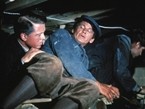
Audiences have thrilled to the sight of Steve McQueen fleeing enemy soldiers on a motorbike in The Great Escape for decades.
Walter Mirisch, who produced the 1963 film as well as other classics like In the Heat of the Night and The Magnificent Seven, says there’s more to The Great Escape than pure entertainment.
“Fifthy innocent men were murdered for doing what the conventions of war gave them the right to do … to try to escape,” Mirisch tells Big Hollywood. “There’s a lesson in that. Hopefully, people will learn something from it, while at the same time being inspired by the courage and bravery of those men.”
The Great Escape’s lessons–and muscular storytelling–can be relished anew thanks to a new Blu-ray edition of the Steve McQueen epic. The film’s sprawling tale is based on a real World War II escape, but the filmmakers used creative license to sweeten an already compelling story.
The war film also cemented McQueen’s ascension to movie stardom, although Mirisch recalls the actor’s on-set demeanor as fully cognizant of his gifts.
“He was a cool character … very charming, very endearing, a fun guy to be with,” Mirisch recalls of the late star. “He was a very special …he was not excitable. He was very comfortable in his own skin.”
The Great Escape grew from Mirisch’s working relationship with director John Sturges–the pair teamed originally for The Magnificent Seven. They read Paul Brickhill’s non-fiction book describing the remarkable escape from a German war camp and thought it could make a good film project.
“In order to make it a moving picture we invented all the characters and the interplay, a very creative process,” he recalls.

Pressed to recall a favorite scene from the film, Mirisch chooses the sequence in which the French underground arrives to machine gun the German officers, saving the life of James Coburn’s character.
“It’s a marvel of storytelling … in very short order it tells so much,” he says.
Few film producers were as hands on, or as successful, as Mirisch proved during his decades in the film industry. He can’t point to any professional secret save making the kind of films he wanted to see.
“I’ve tried in many of my pictures to try and tell something that is instructive to an audience … that has some kind of educational value … while at the same time clothing it in entertainment.”
For The Great Escape, he was able to characterize man’s ability to withstand enormous obstacles with scenes like McQueen’s character throwing a baseball against the wall repeatedly while doing hard time in the POW’s cooler cell.
Hollywood is obsessed with remakes at the moment, but there’s no current push to make a new Escape for today’s audiences. Mirisch chuckles at the thought of a producer tackling such a project.
“Anybody who thinks that they can make that story better or cast it better … they’re welcome to try,” he says.

COMMENTS
Please let us know if you're having issues with commenting.